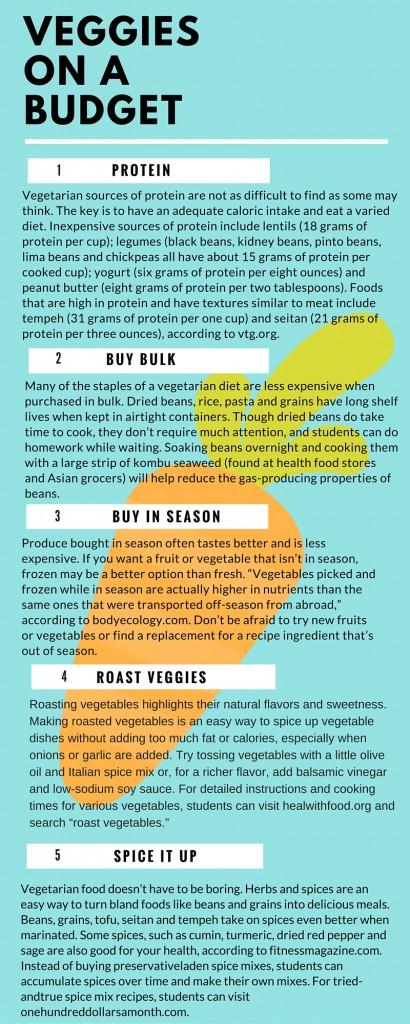By Megan Smith
Assignment Editor

Student shares tips on transitioning into a vegetarian diet on a modest budget.
About 3.2 percent of the population, or 7.3 million U.S. adults, are vegetarian, according to a 2008 study conducted by vegetariantimes.com. While some may be concerned that being vegetarian is too expensive, eating a meat-free diet can be less expensive than eating meat.
According to a 2014 article on nbcnews.com, meat was more expensive in 2014 than it was the year before due to drought, disease and demand. There are many reasons to eat a vegetarian diet besides being an animal lover. I became a vegetarian because I learned about the cruelty that takes place on factory farms, and that animal agriculture is also bad for the environment.
“Livestock are one of the most significant contributors to today’s most serious environmental problems,” Henning Steinfeld, senior UN Food and Agriculture Organization official, said in an article on un.org. “Urgent action is required to remedy the situation.”
Sticking to a vegetarian diet also has health benefits. “In prospective studies of adults, compared to nonvegetarian eating patterns, vegetarian eating patterns have been associated with lower prevalence rates of type 2 diabetes, cardiovascular disease (CVD), hypertension and obesity and reduced medical care usage,” according to diabetesjournals.org.
Brookhaven College librarian Lois Wagenseil said she has been eating a vegetarian diet for almost six years. “I’m trying to do what I feel like I can to make a small difference for animals’ welfare,” Wagenseil said in an email. “The fact that I’ve lowered my cholesterol by 20 points and that I’m taking a stand for something I believe in makes me feel very good.”
Eating a meat-free diet can be a rewarding experience when done right. “Most importantly, you have to be realistic and patient with yourself when things don’t go as planned or expected,” Heather Crosby, founder of vegan blog YumUniverse, said on her blog.
For an effective transition, take things slow. Start by cutting out red meat one week, then pork, then chicken and fish. While cutting back on meat, add more vegetables, fruits, whole grains, beans and nuts to meals. Don’t feel the need to go full-on vegan to make a positive change.
If you are concerned about not getting proper nourishment or you have a health condition, consult your doctor or a nutritionist before making the switch.






